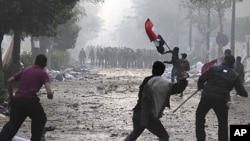In Cairo, violent clashes between protesters and Egyptian military police began early Friday morning and grew larger throughout the afternoon. At least three people have been killed and more than 255 injured as Egyptian security forces clashed with protesters demanding an end to military rule.
A few hundred pro-democracy protesters staged a sit-in in front of Egypt's cabinet building since late November. Protesters said the pitched battle began when one activist, Abboudi Ibrahim, was detained by military police and badly beaten.
The clashes were confined to a broad avenue leading from Tahrir Square in downtown Cairo and several smaller side streets. Throughout the afternoon, a handful of men in plainclothes pitched rocks from the roof of a government building onto jeering protesters in the streets below.
Other protesters said they were beaten by military police. The protesters armed themselves with stones, pitching them at Egyptian troops.
The protesters were mostly young men. Women and older people also took part but many of them stood a few-hundred yards from the front line.
One protester, who would only give his name as Abdullah, said he's been part of the cabinet sit-in for several weeks. He said his primary complaint is the Egyptian economy. A security guard, he has struggled to find work.
"I graduated from school in 1995 and since then I've been looking for a stable job at a good company. I still haven't been able to find one. That's why I'm here," Abdullah said.
Fatah, 51, a housewife, says her husband told her not to go to the cabinet. She told her husband she was going to her sister's house, and rushed to the scene of the clashes instead.
"I've been here every Friday since the revolution started in January. I'm still concerned about what's going on here. I want a democracy. I want the military council to step aside," she said.
Egyptians voted this week in a second round of parliamentary elections. Eighteen of 27 Egyptian governorates have now voted.
Conservative candidates have done better than expected. The Muslim Brotherhood's Freedom and Justice Party commands around 40 percent of the vote and strictly conservative Salafi parties have taken another 25 percent.
Several protesters expressed dismay that conservative candidates have done so well in the parliamentary elections. Others said they are unhappy that Egypt's presidential election will not be held until July of 2012, and demanded that the election be held sooner.
3 Killed as Protesters Clash with Military Police in Cairo
- By Noel King




